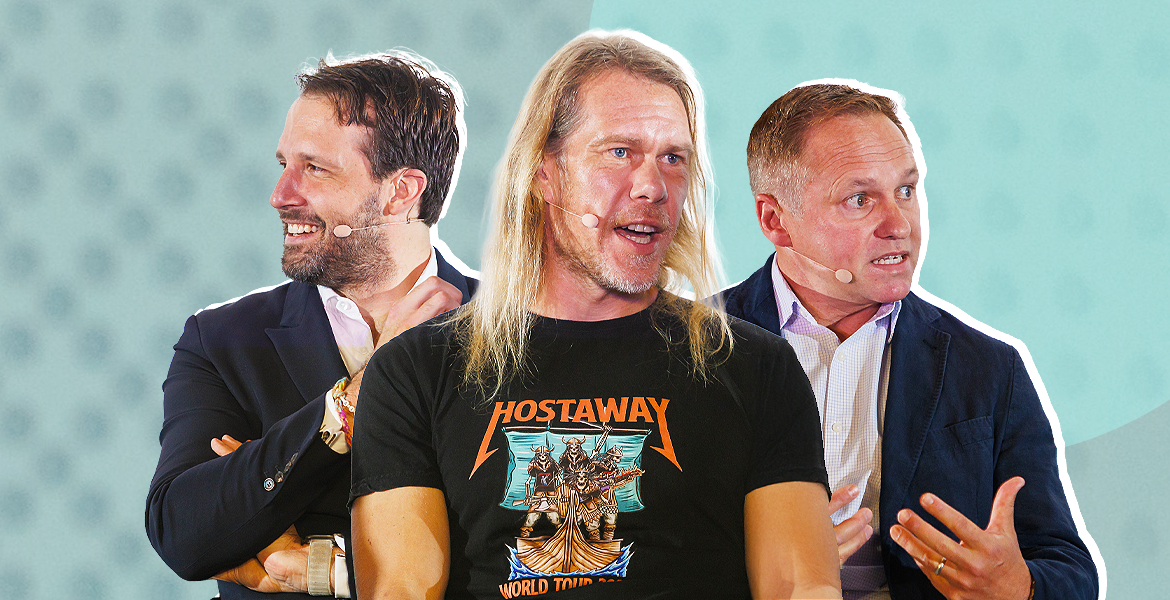If there was any doubt that hospitality tech was due for disruption, the mood at Phocuswright Europe 2025 dispelled it.
In a panel titled Big Ideas, Big Money – Innovation and Growth in Hospitality Tech, three industry voices unpacked the challenges and opportunities that come with building, scaling, and staying relevant in the fast-changing world of travel technology.
“AI is not just a buzzword,” said Sean Fitzpatrick, CEO of Lighthouse. “We’ve never seen a potentially disruptive technology like this in our lifetimes.”
When the audience was asked if they were happy with the pace of innovation over the last decade, most held up red, unhappy faces. The panelists didn’t disagree.
“Honestly, there hasn’t been enough innovation,” said Marcus Rader, CEO and co-founder of Hostaway. “But AI has come to save the day.”
Richard Valtr, founder of Mews, added, “Much of the hospitality innovation happened 30 to 40 years ago. The next cycle is starting now.”
Each founder spoke to how their companies, founded between 10 and 13 years ago, had grown rapidly in spite of entrenched legacy systems. And while each had a different approach, all agreed: the appetite for change is finally catching up with the scale of the problem.
Asked which incumbent they most compare themselves to, or are aiming to disrupt, Fitzpatrick pointed to Amadeus: “They were built in a different time, and their legacy architecture makes it harder to adopt AI. That’s where Lighthouse, built on modern tech, has the advantage.”
Valtr likened his early journey to Oracle’s rise and credited Oracle Hospitality’s customer-centric ethos, but stressed that even disruptors like Mews must now imagine how to “kill themselves” with AI before someone else does.
Rader took a different tack: “Don’t just do what others are doing better – do the opposite.” He built Hostaway to challenge norms, starting with the very look and feel of the company, right down to the heavy metal t-shirts.
All three founders see generative AI and agentic interfaces as transformative, perhaps even the long-awaited unifier of a fractured guest experience.
“This is our chance to redesign the entire traveler journey,” said Fitzpatrick. “From research and booking to payment and the stay, AI allows us to truly personalize that process.”
But while the tech is ready, the industry may not be.
“Operators are not ready,” said Valtr bluntly. “But it’s our job to make it easier for them, not harder.”
Rader offered a practical example: by using AI to scan listings across hundreds of thousands of vacation rental properties, Hostaway was able to automatically correct missing metadata, like flagging properties as ‘waterfront’, which resulted in increased bookings without operators needing to lift a finger.
Valtr urged hoteliers to rethink their own digital presence: “How do I describe my property in a way that an AI can understand? How do I build a knowledge base that lets machines and guests see the best of what I offer?”
From right: (Moderator) Peter O’Connor, Senior Market Analyst, Europe, Phocuswright Inc. | Richard Valtr, Founder, Mews | Marcus Rader, CEO and Co-Founder, Hostaway | Sean Fitzpatrick, CEO, Lighthouse
Despite the panel’s title, the discussion wasn’t just about big money, it was about the right money.
Fitzpatrick championed the investor-founder relationship: “We don’t see a walking checkbook—we do reference checks on investors just as they do on us. The best ones are strategic partners.”
Rader, however, painted a more self-reliant picture. “We built a great business first, and then the investors came to us. And we decided, we don’t take advice from investors. They can pitch, but if they interfere, they’re out.”
Valtr took a middle view, emphasizing that capital should be allocated based on growth opportunity: whether through building in-house, acquiring talent, or bringing in external expertise.
Indeed, Lighthouse’s recent acquisition of Barcelona-based Hotels Network reflects that view: “They’re releasing a product we couldn’t have delivered on our own,” said Fitzpatrick.
Asked to look ahead, all three panelists agreed: the AI era will favor companies that already have the scale, data, and business model to leverage compounding gains.
“AI will mostly benefit bigger companies,” said Rader. “You need a model where incremental improvements, 20% here, 20% there, stack into millions.”
Valtr flipped the lens to the hotelier: “Every operator should ask: how do I automate the boring bits of running my hotel? What if you could run your hotel with just three people?”
But none of this, they stressed, should remove the human from hospitality.
“Hospitality is a people business,” said Fitzpatrick. “AI’s job is not to replace people but to make them better so they can spend less time staring at screens and more time delighting guests.”
As this new cycle of innovation kicks off, the message from the panel was clear: the future belongs to those willing to rethink everything – from architecture and automation to culture and capital.




